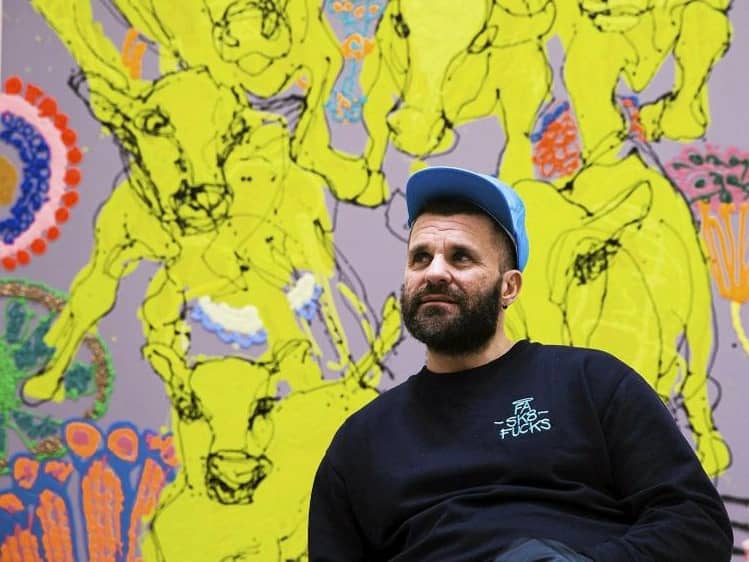Bjarne Melgaard
Bjarne Melgaard는 1967년 9월 9일에 태어났으며 뉴욕시에 거주하는 현대 노르웨이 미술가입니다. 그는 감각적인 설치 미술, 논란이 되는 가구, 표현주의 회화 및 문자 예술에서 현대 미술 작품으로 유명합니다. Bjarne는 어릴 때부터 소설 작업을 했습니다. 그는 자신의 생각을 소설 형태로 표현하는 데 몰두했습니다. 그는 소설 또한 우리를 책 형태로 둘러싸는 '예술 작품'이라고 말합니다.
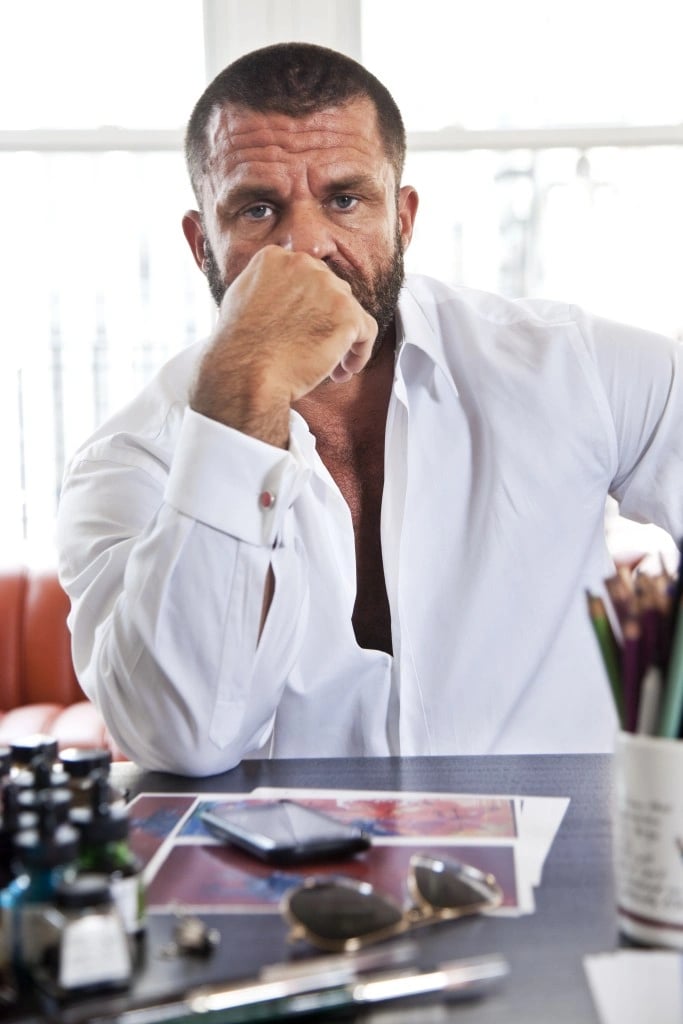
저는 패션에 관심이 있었고 글쓰기에도 관심이 있었습니다. 저는 14권의 소설을 출판했습니다. 어릴 때부터 글을 써왔습니다. 그래서 제가 하는 모든 일과 관련이 있습니다. 저는 제 그림을 소설로, 제 쇼를 소설로 봅니다. 제 생각에는 하나로 보는 것 같습니다. 제 글은 항상 제 그림과 설치 미술에 있었기 때문에 항상 거기에 있었고 그 일부였습니다.
Bjarne Melgaard가 뉴욕의 Red Bull Arts와의 인터뷰에서 말했습니다.
초기 생애 및 교육
Bjarne Melgaard는 1967년 호주 시드니에서 노르웨이 부모에게서 태어나 노르웨이 오슬로에서 자랐습니다. 그는 1991년 노르웨이 오슬로 국립 미술 아카데미를 졸업했습니다. 이후 네덜란드 암스테르담의 Rijksacademie에서 공부하고 1992년에 졸업했습니다. 1993년에는 네덜란드 마스트리흐트의 Jan van Eyck Academie에서 학업을 마쳤습니다.[4]
예술 경력
멜가르드의 작품은 사회, 정치, 이념적 문제를 중심으로 다룬다. 비야르네 멜가르드의 예술은 자기 파괴, 일탈적인 성, 기이한 종교적 믿음과 같은 인간성의 어두운 면을 다룬다. 그는 사회적 수용의 경계를 논의하고, 조사하고, 확장한다[3]. 시각 예술 활동 외에도 멜가르드는 다작 큐레이터, 작가, 영화 제작자, 패션 디자이너로 활동한다. 그의 작품은 헤비메탈 음악, 약물 중독, 증강 및 가상 현실을 포함한 도발적인 하위 문화를 탐구한다.
비야르네의 예술 작품은 종종 두꺼운 유화 물감, 합성 머리카락, 단색 배경에 마음을 자극하는 색상의 메이크업으로 만들어진 동물과 인간으로 구성된다.
멜가르드는 런던 현대 미술 연구소(ICA)(2012)와 오슬로 아스트룹 페안리 현대 미술관(2010)에서 개인전을 포함하여 국제적으로 광범위하게 전시했다. 그는 또한 베니스(2011), 리옹(2013), 휘트니(2014) 비엔날레에 참가했다.
- 1996년, 벨기에 겐트 현대 미술관에서 그의 첫 개인전이 열렸다. 노르웨이 오슬로의 Galleri c/o Alte Gerhardsen에서 열린 '회복 중인 미니멀리스트의 고백, 기욤 빌'[5]
- 2000년 뉴욕에서 열린 그의 첫 패션 개인전에서는 아기 옷을 입은 살아있는 치와와와 노골적인 성행위를 하는 유인원 조각품이 전시되었다. 그의 가장 악명 높은 작품은 또한 가장 논란이 많은 작품이다.
- 2013년 뉴욕 개빈 브라운 엔터프라이즈에서 열린 그의 전시회 '무지한 투명성'에는 멜가르드의 분신으로 묘사된 사이키델릭한 색상의 페인트 덩어리로 덮인 거대한 크랙 담배를 피우는 핑크 팬더가 포함되었다.
내 작품에 묘사된 소위 전복적인 문화는 일반 문화의 일부라고 생각한다. 단지 눈에 띄지 않을 뿐이다. 사람들이 매일 미디어에서 접하는 것들이 예술에서 다루어질 때 훨씬 더 도발적으로 변한다.
비야르네가 말했다.[9]
- 멜가르드는 특히 알드리치의 작품을 존경하며 다음과 같이 말한다.
알드리치의 작품은 이해하기 너무 어렵고 전혀 이해할 수 없다. 또한 완전히 비선형적이다. 그가 하는 일은 내가 하는 일과는 너무나 거리가 멀기 때문에 흥미롭다.
실제로 알드리치의 광대한 흰색 작품은 멜가르드의 생생한 초상화와 완전히 시각적으로 대조되는 것처럼 보이며, 멜가르드는 그 주제를 비밀에 부친다. 그것들은 '가상 인물과 실제 인물의 혼합'이라고 한다.[12]
논란
인종차별적인 의자
2014년 1월, 비아르네의 작품 의자가 논란을 일으켰습니다. 의자는 도발적인 성적 자세로 조각되었으며 영국 팝 아티스트 앨런 존스의 유사한 작품을 재해석한 것입니다. 예술에서의 불쾌감은 종종 부정을 풍자하는 방법입니다. 그러나 이 도발적인 조각품은 유명인을 함정에 빠뜨리고 인종차별주의자라고 부르는 대중 문화에 순진하게 주입되었습니다.[16]
논란은 러시아 예술계 인사 다샤 주코바가 패션 웹사이트를 위해 쿠션에 앉아 있는 사진이 찍히면서 시작되었고, 이는 온라인에서 격렬한 인종차별 비난으로 이어졌습니다.
주코바는 이러한 격렬한 논란을 듣고 다음과 같이 답했습니다.
완전히 맥락에서 벗어나 게재된 이 사진은 성별 및 인종 정치에 대한 논평을 위해 특별히 의도된 예술 작품입니다. 저는 인종차별을 극도로 혐오하며 이 이미지로 인해 불쾌감을 느낀 모든 분께 사과드립니다.
멜가드 자신도 일부 작가들이 "기괴하다"고 칭한 논란에 대한 성명을 발표했습니다.
죽음의 집
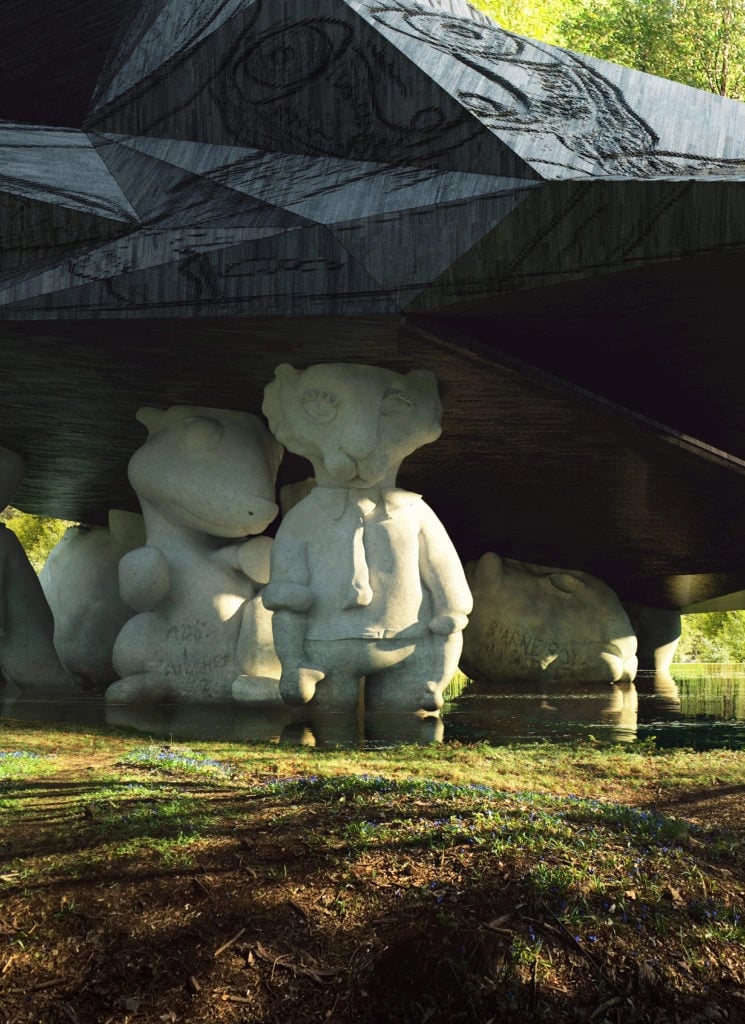
1989년에 빌라가 철거된 이후로 부지에 아무것도 지어지지 않았으며, Selvaag 형제는 Bjarne Melgaard를 대신하여 야심찬 예술 프로젝트를 실현하고 그의 개인 주거 및 아틀리에로 기능할 수 있는 집을 공동으로 만들 수 있는 좋은 기회라고 생각합니다.[11]
에드바르 뭉크의 이전 집터 옆에 우주적인 집을 짓는 것은 오슬로에서 또 다른 차질을 겪었습니다. 8월 20일, 시의회는 성명에서 '죽음의 집'이라고 언급하며 프로젝트를 막았습니다. 뭉크의 후손들은 멜가르드가 뭉크를 폄하하고 있다고 주장했습니다.
노르웨이 정치인들은 건물의 건설에 반대하며 다음과 같이 말했습니다.
우리는 죽음의 집이 놓일 예정이었던 부지가 지역 주민들을 위한 녹지로 유지되기를 바라며, Bjarne이 프로젝트를 위한 새로운 부지를 찾도록 장려합니다.
짐 퀸즈는 죽어야 한다
2015년, 경찰은 비아르네의 오슬로 뭉크 미술관 전시회에 아동 성애 혐의로 출동했습니다. 방문객들은 그의 비디오인 짐 퀸즈는 죽어야 한다에 대해 불만을 제기했는데, 이 비디오에는 모델이 아기의 팔을 성적인 방식으로 입에 넣는 장면이 담겨 있었습니다. 그는 아동 성애 혐의로 고발되었지만, 노르웨이 경찰은 범죄 혐의를 발견하지 못했습니다. 뭉크 미술관은 전시회를 강력히 옹호했으며, 일부는 뭉크 자신도 당대에는 도발적인 인물이었다고 지적했습니다.[15]
시각 보조 자료
2012년, 에이즈 룰렛이라는 공연 작품에서 6명의 남성이 성행위를 하며, 그 중 한 명이 에이즈 양성 판정을 받습니다.
엘리자베스 그리고 나
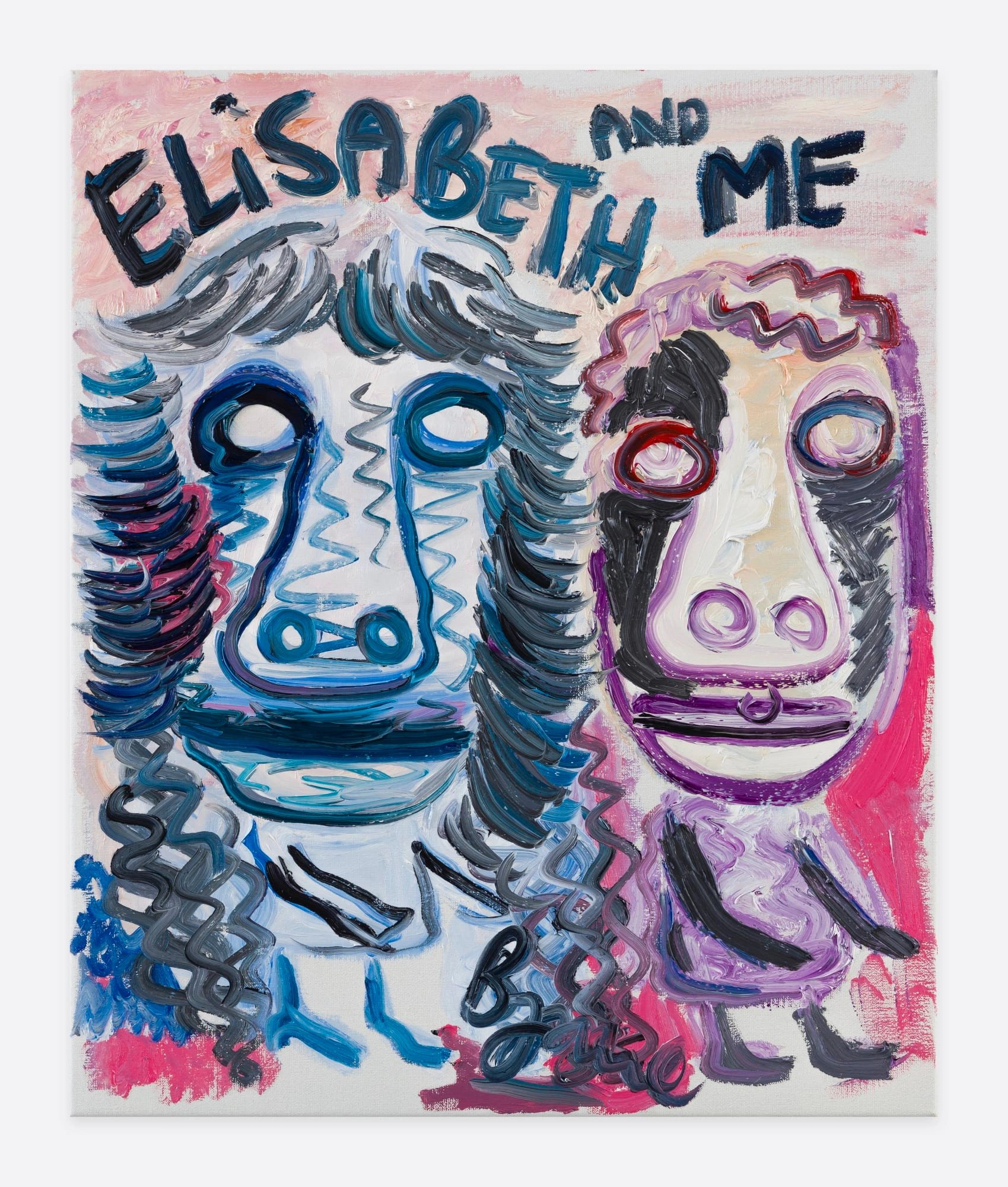
Bjarne는 Elizabeth Wurtzel을 만난 적이 없지만 그녀의 불편함에 가까움을 느꼈습니다. 그는 그들 둘 다 북유럽 문화에 공통된 뿌리를 가지고 있을 뿐만 아니라 같은 정신과 의사를 가지고 있다는 것을 발견했습니다. Wurtzel의 도발적인 행동은 Bjarne의 그림에서 반향을 일으키며, 그녀의 제스처를 두껍게 굳힌 밝은 색상으로 전복적이고 직관적으로 표현합니다.[13]
실망의 캐주얼한 즐거움
2017년, 비야르네는 그의 지속적인 '패션' 프로젝트의 정점인 실망의 캐주얼한 즐거움을 시작했습니다. 그는 2층짜리 레드불 갤러리를 교외 쇼핑 센터를 연상시키는 쇠퇴하는 설비로 가득 찬 '정신병리학적 백화점'으로 탈바꿈시켰습니다.
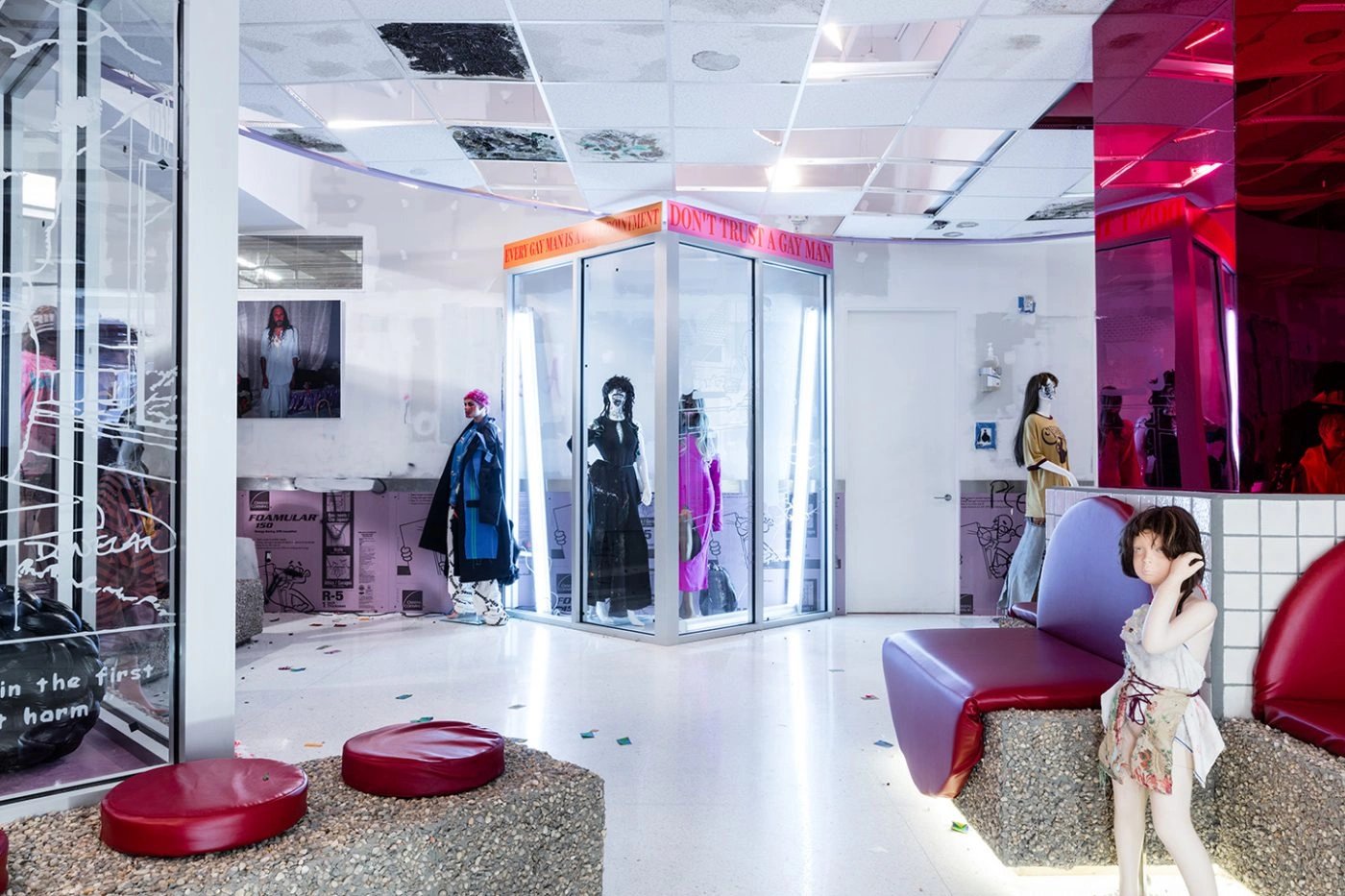
전시회
1996년부터 2021년까지 비야르네 멜가르드는 220회 이상의 개인전에서 작품을 전시했습니다.
- 그 중 2000년 뉴욕 Alleged Gallery에서 열린 The Mutilation of the Apes는 대중의 분노를 일으켜 그를 논란의 여지가 있는 예술가로 만들었습니다.
- 2008년 Faurschou, 코펜하겐; Edvard Munch: Tribute And Inspiration은 비야르네 멜가르드를 그의 정신적, 스타일적 멘토였던 에드바르 뭉크 이후 가장 유명한 노르웨이 예술가로 묘사했습니다.
- 2012년 런던 현대미술연구소(ICA); Matt Williams가 큐레이팅한 Bjarne Melgaard: A house to die in에서는 그의 '실험실'이 몇몇 조각상을 기반으로 구축될 비전으로, 'Death House'라고도 언급되었습니다.
- 같은 해 뉴욕 La MaMa Galleria에서 Visual AIDS가 큐레이팅되었으며, 그곳에서는 6명의 남자가 성행위에 관여하고 있으며 그 중 한 명은 AIDS 양성 반응을 보였습니다.
- 2015년 노르웨이 오슬로 뭉크 미술관에서 열린 Munch and Melgaard: The end of it all has already happened는 뭉크의 죽음에 대한 그의 헌사로 유명했습니다.
공공 컬렉션 및 문헌
Bjarne는 16개 이상의 공공 컬렉션을 보유하고 있습니다. 그 중 오슬로 국립 현대 미술관이 그의 출판물을 가장 많이 소장하고 있습니다.
- 2002년에는 'Bjarne Melgaard - Interface To God'와 'Black Low // The Punk Movement Was Just Hippies With Short Hair'가 출판되었습니다.
- 2010년에는 'Bjarne Melgaard: Jealous'와 'Design: An Art Service'가 출판되었습니다.
Lightbulb Man(LBM)
그의 모든 작품은 그에 의해 '무제'로 출판되었습니다. 그러나 Lightbulb Man 작품이 구매되면 디지털 아트 역사에 각인하여 이름을 짓고 새길 수 있습니다. 1025개의 독특한 예술 작품이 출판되었으며, 동일하면서도 완전히 다릅니다. Melgaard는 각 작품을 특별하고 숨겨진 특징으로 만들어 모든 Lightbulb Man을 다음 작품과 다르게 만들었습니다. 독특한 특징, 색상, 물체 및 기타 마커는 모두 Bjarne의 예술적 표현으로 개념화되었습니다.
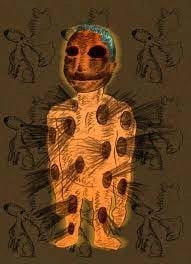
Lightbulb Man과 그의 불안한 존재는 그 형상 자체를 넘어 명확하게 표현하기 어렵지만, web3 배포를 통해 생생한 색상에 대비되는 침울한 표정으로 조각을 재작업하면 신화적인 작품에 대한 논의가 다시 시작됩니다. 물리적인 Lightbulb Man은 노르웨이 국립 미술관에 있는 외로운 청동 조각상입니다. [10]
AR & VR
증강 현실
2020년 Bjarne Melgaard의 AR 프로젝트는 그의 폭넓은 작품에서 캐릭터와 모티프를 사용하며, 이는 중앙 아프리카의 콩고 민주 공화국 식민지화부터 빅테크의 국제적 영향력에 이르기까지 다양한 현재 및 역사적 사건을 참조합니다.[18]
가상 현실
그의 가상 현실 작품인 My Trip(2019)은 관람객/사용자를 다크 웹의 가장 먼 곳으로 안내합니다. 그는 몰입형 가상 풍경을 만들고 베를린의 가상 현실 전시회에 참가하여 뇌의 샘에서 생성되는 자연 발생 약물인 DMT[디메틸트립타민]의 경험을 복제하기 위해 디지털 매체를 활용했습니다. DMT는 가장 강력한 환각 화학 물질로 간주되며 지구상의 거의 모든 생물체에서 발견됩니다.
Acute Art와 협력하여 만든 새로운 돌연변이 및 개성과 더불어 Lightbulb Man 및 Octo를 포함하여 25년 이상 예술가의 작업에서 반복적으로 등장한 캐릭터를 특징으로 하는 그의 작품인 My Trip은 DMT 경험의 환상을 시각적으로 자극적으로 보여줍니다.
자살이라는 실존적 질문, 새로운 사이키델리아, DMT 여행에서 자아의 상실이라는 아이디어로 시작하여 삶과 사람들이 어떻게 살아가기로 선택하는지에 대한 질문이 제기되는 동시에 멜가르드의 반출생주의와 과잉 인구에 대한 관점을 소개합니다.[20]
2002년 코펜하겐의 Galleri Faurschou에서 전시된 Nothing Special에서 비야르네는 갤러리 공간을 총체적인 설치 공간으로 변모시켰고, 여기서 예술가의 존재/부재가 중요한 역할을 하며, 쌓여진 오브제들이 살아 움직입니다. 탐욕스럽고 거대한 몸에 의해 소비되고 배출된 제품의 혼돈처럼 보이는 이 공간에서 관람객은 완전히 몰입됩니다. 전시된 작품 중에는 “You are my sunken beach”라는 노래 구절이 쓰여진 거대한 반투명 컬러 배너가 있었습니다. 배너와 멜가르드의 전체 예술 이야기에서 반복되는 요소인 일부 캐릭터가 등장하는 그림과 함께 “Chemical Diary”라는 제목의 일련의 드로잉과 작은 조각품이 있었습니다.[19]
투자자
- 이스라엘-러시아 억만장자 로만 아브라모비치는 2013년 5월 스웨덴 스톡홀름의 부코스키 경매에서 비아르네의 작품을 구매했습니다.
- 호세 무그라비와 비토 슈나벨은 같은 경매에서 멜가르드 작품을 구매했습니다. 그 외 주목할 만한 투자자로는 프랑수아 피노와 크리스텐 스베아스가 있습니다. [6]
